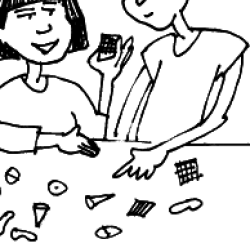Source Institutions
Source Institutions
Add to list Go to activity
Activity link broken? See if it's at the internet archive

In this activity (on pages 2-8), learners experience how scientists use classification in their study of animals. They sort pictures of parasites according to characteristics such as shape, size, wings, legs, body sections, cells, site on host organism, and food source. The "What We Know" section introduces divisions in the animal kingdom, including two broad groups of parasites—endoparasites that live inside a host organism, and ectoparasites that live on the exterior of or outside a host organism. Excerpts from the video and biography of parasitologist Judy Sakanari are available online, and the full version of the video can be purchased in the commercial Wonderwise Parasite Sleuth Kit.
- 10 to 30 minutes
- 1 to 2 hours
- 1 cent - $1 per group of students
- Ages 8 - 14
- Activity
- English, Spanish
Quick Guide
Materials List (per group of students)
- Optional: Excerpt of "Judy Sakamuri, Parasite Sleuth" video (full version in commercial kit)
- Optional: PDF Biography of Judy Sakamuri
- glue
- scissors
- 1 cup of objects like buttons, nuts, leaves, seeds, seashells or Pattern Blocks
Subjects
-
Life Sciences
-
Diversity of Life
- Animals
- Viruses and Bacteria
- Protists and Fungi
- Classification
-
Ecology
- Biodiversity
-
Diversity of Life
-
The Nature of Science
-
The Scientific Process
- The Scientific Worldview
- Science as a Career
-
The Scientific Process
Audience
To use this activity, learners need to:
- see
- touch
Learning styles supported:
- Involves teamwork and communication skills
- Uses STEM to solve real-world problems
- Involves hands-on or lab activities
Designed specifically for
- Rural dweller
Culture, ethnicity, and gender
-
Girls
- Explicity developed for this group
- Identifies role models or mentors in STEM fields from this group
Other
Foreign language versions of this resource:
Components that are part of this resource:
- How to Use Wonderwise
- Parasite Sleuth Community Service Ideas
- Excerpt of "Judy Sakamuri, Parasite Sleuth" video (full version in commercial kit)
- Biography of Judy Sakanari
Includes alignment to state and/or national standards:
This resource is part of:
Access Rights:
- Free access
By:
Source Collection
- Science After School Consumer's Guide
Rights:
- All rights reserved, University of Nebraska State Museum, 2001
Funding Sources:
- NSF Informal Science Education Program, 9909496
- Howard Hughes Medical Institute
